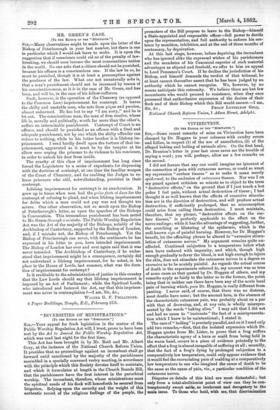MR. GREEN'S CASE.
/To THE EDITOR OP THE " SPECTATOR."]
Sia,—Many observations might be made upon the letter of the Bishop of Peterborough in your last number, but there is one in particular which I would ask leave to make. It is upon the suggestion that if conscience could rid us of the penalty of law- breaking, we should soon become the most conscientious nation in the world. No one asks that a citizen should not be punished, because his offence is a conscientious one. If the law be so, he must be punished, though it is at least a presumption against the goodness of the law. What one not unnaturally asks is, that a man's punishment should not be increased by reason of his conscientiousness, as it is in the case of Mr. Green, and has been, and will be, in the case of his fellow-sufferers.
Such, however, is the operation of the Chancery (as opposed to the Common Law) imprisonment for contempt. It leaves the shifty and unstable man, who acts from pique and passion, almost unharmed. He has but to say "I am sorry," and he is let out. The conscientious man, the man of firm resolve, whose life is, morally and politically, worth far more than the other's, suffers an interminable punishment. Contempt of Court is an offence, and should be punished as an offence with a fixed and adequate punishment, not by one which the shifty offender can reduce to nothing, while to his better brother it is lifelong im- prisonment. I need hardly dwell upon the torture of that im- prisonment, aggravated as it must be by the tempter at his elbow ever urging the prisoner to do violence to his concience, in order to unlock his door from inside.
The cruelty of this class of imprisonment has long since forced the Legislature to a series of expedients for dispensing with the doctrine of contempt, at one time the familiar weapon of the Court of Chancery, and for enabling the Judges to re- lease prisoners who still, notwithstanding, persisted in their contempt.
Lifelong imprisonment for contempt is an anachronism. It grew up in times when men had the peine forte et dare for the contempt of refusing to plead, and when lifelong imprisonment for debts which a man could not pay was not thought too severe. One other observation, not so much upon the Bishop of Peterborough's letter, as upon the speeches of the Bishops in Convocation. This tremendous punishment has been meted to Mr. Green through a mistake. The Public Worship Regulation Act was the Act of the majority of the Bishops, notably of the Archbishop of Canterbury, supported by the Bishop of London, and, if I mistake not, the Bishop of Peterborough. Yet the Bishop of Peterborough can never, with the sentiments he has expressed in his letter to you, have intended imprisonment. The Bishop of London has over and over again said that it was never intended. The Archbishop of Canterbury, if he under- stood that imprisonment might be a consequence, certainly did not understand a lifelong imprisonment, for he asked, in his place in the House of Lords, last summer, what was the dura- tion of imprisonment for contempt?
Is it creditable to the administration of justice in this country that the Law Lords should say that lifelong imprisonment is imposed by an Act of Parliament; while the Spiritual Lords, who introduced and fostered the Act, say that this imprison- ment was never in contemplation P—I am, Sir, &c.,


































 Previous page
Previous page